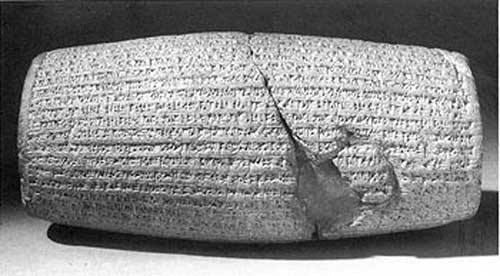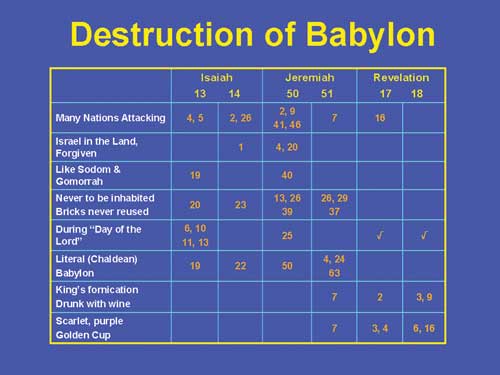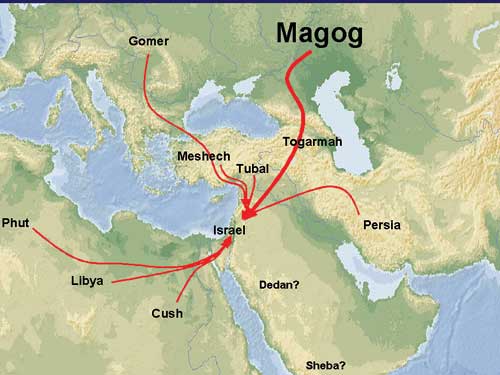The most important city in Iraq is not Baghdad, and you probably have never heard it mentioned on the 10 o'clock news. It is mentioned over 300 times in the Bible (and it is even found three times in the family tree of our Lord Jesus Christ). This is, of course, the fabled Babylon.
It was founded by the first world dictator, Nimrod, and it may well be destined to be the capital of the final world dictator, commonly called the Antichrist! And this all may be emerging on our near horizon.
Misinformation
Don't be misled by confusing the Fall of Babylon in history with the Destruction of Babylon, as prophesied in the Bible.
Many Bible handbooks, dictionaries, and commentaries give you the impression that Babylon was "destroyed" in 539 B.C. But it is important to realize that when Cyrus the Great captured Babylon he was able to take it over without a battle . In fact, this feat is celebrated in the famed Cylinder of Cyrus that is featured in the British Museum in London.

Babylon served as a secondary capital of the Persian Empire for two centuries until Alexander the Great conquered the Persians in 325 B.C. He made it his capital; in fact, he died there.
Four of his generals then divided up the empire, and subsequently Babylon gradually atrophied over the centuries. Yet, when Robert Koldewey, the German archaeologist, excavated it at the end of the 19th century, he was able to hire local residents to assist him.
The Destiny of Babylon
The prophets Isaiah and Jeremiah each spend two chapters detailing the catastrophic destruction that awaits this fabled city. The result of this final devastation will leave it uninhabitable; even the building materials will never be reused. This clearly has never happened in its history-its rebuilding was begun by Saddam Hussein, and it apparently is yet destined to reemerge on the world scene to receive the destruction which is so detailed by Isaiah and Jeremiah.
What further complicates this perspective are the details that are added in the Book of Revelation. These passages alone have prompted numerous books, and many fanciful conjectures, regarding the potential allegorical and metaphorical applications from the Patmos vision John recorded. It is illuminating to read-at one sitting-the six principal chapters dealing this topic: Isaiah 13 and 14, Jeremiah 50 and 51 and Revelation 17 and 18. (Some of the specific issues that emerge are summarized in this chart:

Clearly Babylon, as a literal city on banks of the Euphrates, has a climactic destiny yet ahead of it. The destruction described in both the Old and New Testaments has never happened , and if we take the Bible seriously then Babylon is destined to rise again to power to receive the judgment that Isaiah, Jeremiah, and the Apostle John have described.
We also need to recognize that during the successive empires, the "mystery religions" that began in Babylon were subsequently transported to the various world capitals: to Pergamos under the Persians1 and subsequently to Rome, where they became the foundation of all that was (and still is) pagan in that city.
And, of course, when Christianity became the official religion of the Roman Empire under the second successor after Constantine, Theodosius II (A.D. 378-398), many of these idolatrous trappings were repackaged with "Christian" labels.
Many of these traditions are still very visible in the practices of the Roman Catholic Church, but are also visible, in more subtle forms, in many other denominations as well. Perhaps the most significant study of these practices and their history is Dave Hunt's milestone work, The Woman That Rides the Beast 2, which is a modern response to Alexander Hislop's classic, The Two Babylons , published in 1916.3
Are the prophetic references to "Babylon" to be taken literally-an actual city on the banks of the Euphrates-or metaphorically, to include the Vatican and the final apostate ("ecumenical") world church? There are many good scholars on both sides of this debate. It may well be that both views are true.
A Return to Origins?
The key to this apparent paradox seems to be hinted at in the enigmatic vision given to Zechariah, in which he sees a woman, labeled "wickedness," sealed in an ephah (the standard commercial volumetric measure in those days), with a lead lid enclosing her for transport:
Then lifted I up mine eyes, and looked, and, behold, there came out two women, and the wind was in their wings; for they had wings like the wings of a stork: and they lifted up the ephah between the earth and the heaven. Then said I to the angel that talked with me, Whither do these bear the ephah? And he said unto me, To build it an house in the land of Shinar: and it shall be established, and set there upon her own base.
Zechariah 5:5-11
(Remember, this vision is Jewish: the "wings of a stork" implies something sinister: the stork was an unclean bird.)
This vision seems to portray the woman, labeled "wickedness" (perhaps the same woman portrayed in Revelation 17 as the "Mother of Harlots"), being relocated to where it all began: the plain of Shinar, the original location of Babylon and its sinister occultic religion. It would seem that it is located there to again rise to power and to receive God's final judgment.
Smart Bombs?
Incidentally, Jeremiah includes a detail that would seem to be a technology statement:
For, lo, I will raise and cause to come up against Babylon an assembly of great nations from the north country: and they shall set themselves in array against her; from thence she shall be taken: their arrows shall be as of a mighty expert man; none shall return in vain.
Jeremiah 50:9
The word "arrow" is חץ chets, which can mean a dart, arrow, or javelin; or "any missile fired from an engine of war." In the Septuagint, the Greek βολὶς can mean anything thrown: a missile, such as an arrow or javelin. Notice, however, that the adjective clause "as of a mighty expert man" is a descriptor of the arrow, not the shooter of the arrow. The key Hebrew word is שָׂכַל, sakal, which means prudent, wise, circumspect; with insight and comprehension. It is the arrow itself that has the intelligence! This, indeed, is further emphasized in the final clause: "none shall return in vain." They can't miss !
Sounds like "smart weapons": a guided missile or smart bomb. And this was written over two thousand years ago.
Whence Babylon?
The future of its modest rebuilding will be instructive to follow. The Shiites in Iraq are agitating to take over Babylon as their capital-in contradistinction to the Jewish Jerusalem.
My friend Tim LaHaye has indicated that there is even talk of the UN moving to Babylon. At first this may sound fanciful, but it seems that the UN is highly desirous of moving out of New York for several reasons: they feel too cramped to contain badly needed growth; and, they also have a desire to get out from under the domestic policies there. But where to go? There are numerous suggestions that are too politically complex to analyze in this brief review.
It is interesting to recognize that there are also scattered pockets of Assyrian communities throughout the world that have been without a national homeland for 2400 years! Some have expressed elation in the impending changes in Iraq as harbingers of more changes yet to come.
Let's keep in mind that there are a number of passages that indicate that the Antichrist will be-in some sense-an Assyrian.4 It is a good time to set aside our presuppositions and prejudices of the past, and carefully reexamine all the prophetic passages that pertain to the end times. (The only certain barrier to truth is the presumption we already have it .)
Another Signpost: Turkey
Last month, ten nations joined the fifteen that had previously made up the European Union. They are now twenty-five, with a population base 60% larger than the United States and with a combined economy that is-today-20% larger.5 In 2007, Rumania and Bulgaria are also scheduled to join the EU.
There is another country that has been very serious about joining, but whose membership continues to appear problematical: Turkey. For over 80 years, Turkey has changed its laws, its alphabet, its calendar, etc., all in a determined effort to be accepted by "the West." They have joined the UN, the IMF, the OECD, NATO, and were also accepted as an "associate member" in the precedent European Community under the specific stimulation that they would be allowed full membership eventually.
Yet, after more than a decade of deferrals, it appears to many that they really are not welcome. Their entrance into the European Union is a hotly debated topic, especially in the private chambers of power.
It seems likely that this will all come to a head before the end of this year. Either they will be allowed membership or they will have to face the reality that their future is eastward rather than westward-toward the Islamic Middle East rather than with the West.
 There are some of us who have assumed that their denial of entrance to the EU, and their subsequent embracement of the Islamic East, would seem to set the stage for the "Magog Invasion" that is detailed in Ezekiel 38 and 39.6 All the other allies described by Ezekiel would seem to be in position, except for Meshech and Tubal, which were prominent cities in Anatolia, the country that makes up the eastern two-thirds of modern Turkey. (Some scholars are concerned over a disturbing hint of a possible intercontinental ballistic missile exchange in Ezekiel 39:6.)
There are some of us who have assumed that their denial of entrance to the EU, and their subsequent embracement of the Islamic East, would seem to set the stage for the "Magog Invasion" that is detailed in Ezekiel 38 and 39.6 All the other allies described by Ezekiel would seem to be in position, except for Meshech and Tubal, which were prominent cities in Anatolia, the country that makes up the eastern two-thirds of modern Turkey. (Some scholars are concerned over a disturbing hint of a possible intercontinental ballistic missile exchange in Ezekiel 39:6.)
On the other hand, if the European Union does admit Turkey, that might suggest a longer-term view: perhaps subsequent EU acquisitions could ultimately include additional neighbors to the east: Syria or Iraq. The pragmatics of Europe's desperate dependency on Middle Eastern oil would play a strategic role in such considerations. It would also bring them into a consistency with borders of the original Roman Empire, and that should give us all serious pause for scholastic reflection.
Further, a deliberate strategy of either controlling the UN, or eclipsing it, is undoubtedly a dynamic behind many EU political agendas.
A Turbulent Year Ahead
There are several other factors that threaten the global horizon this year. With (a) Al Qaeda's likely agenda-prior to or subsequent to-our own national election this November; and (b) with the emergence of Saudi Arabia's nuclear ballistic missile capabilities,7 and, thus, (c) the likelihood of a preemptive strike by Israel on El-Solayil (which could also include both Mecca and Damascus), many in the strategic community are becoming increasingly apprehensive.
Clearly, it is a crucial time for each of us to dig in and do our Biblical "homework." It is important to review and study these issues, and they, in turn, should have an impact on our personal priorities. It is time to take God seriously, and determine His agenda for each of us, personally and professionally, in the days ahead. Our Grand Adventure continues!
Notes:
- Revelation 2:13.
- Hunt, Dave, A Woman Rides the Beast, Harvest House, Eugene OR, 1994
- Hislop, Alexander, The Two Babylons , Loizeaux Brothers, Neptune, New Jersey, 1916.
- Micah 5:5,6; Isaiah 10; et al. See our Briefing Pack, Expectations of the Antichrist.
- Europa Rising, Chuck Missler.
- See our Briefing Pack, Roots of War, for a comprehensive profile of the Middle East.
- 120 CSS-2. MMRBM (1500 km range), each with 3 nuclear warheads, presently being installed at El-Solayil.





